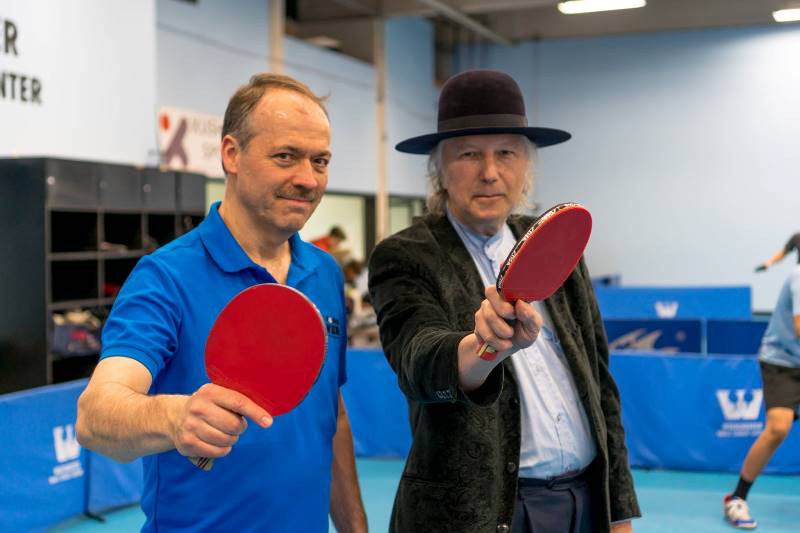Parkinson’s Disease (PD) robs millions of people of autonomy over their own bodies. An innovative new program is using table tennis to offer hope to the millions afflicted by this cruel disease. The program is called Ping Pong Parkinson, a non-profit which invites those living with PD to challenge their perceived limitations and live fuller lives. Ping Pong Parkinson was founded in 2017 by world-renowned musician Nenad Bach (pictured, right), along with Irene Silbert and Dr. Art Dubow. Every Wednesday, the group meets at the Westchester Table Tennis Center in Pleasantville, New York, a dedicated table tennis club owned by New York Times crossword puzzle editor Will Shortz (pictured, left). According to Dr. Dubow, PD is a “progressive neurodegenerative disorder.” This means that the disease gradually debilitates the nervous system, and for most patients there is no cure for the steady worsening of symptoms. Bach, a Croatian-born composer and peace activist who has shared the stage with everyone from Luciano Pavarotti to U2, has found that table tennis helps him live with the symptoms of PD. “I stopped playing the guitar five years after I was diagnosed with Parkinson’s, but then I started playing table tennis and I felt 50% better,” said Bach. “Now I am playing the guitar again.” According to Bach, the benefits of playing table tennis are multifaceted. “I stand up more straight, stature better,” he says. “I shake less and I think better.” Dr. David Russell, Bach’s physician, has confirmed the palliative effect of table tennis: “He clearly got better when he really kind of delved into ping-pong.” Continued Dr. Russell, “It’s something we should look at, the way we look very scientifically at things like tai chi and tango dance, that this would be an area worth exploring.” As Dr. Dubow explains, “The goal of Ping Pong Parkinson is to halt the progression, and possibly reverse the symptoms of Parkinson’s disease.” Indeed, the weekly meeting has become a wellspring of testimonials supporting the benefits of table tennis for those diagnosed with PD. The evidence is not merely anecdotal. In 2006, researchers Crizzle and Newhouse conducted a meta-analysis of studies examining the therapeutic value of exercise for PD patients. In their conclusion, they stated, “The results of the present research synthesis support the hypothesis that patients with PD improve their physical performance and activities of daily living through exercise.” As Crizzle and Newhouse suggested, “Future studies should include the development of standardized exercise programs specific for problems associated with PD.” Ping Pong Parkinson has done exactly that. According to their official website, pingpongparkinson.com, “The sessions begin with a warm-up consisting of physical exercises designed specifically for those with Parkinson’s Disease.” Indeed, Ping Pong Parkinson is a step ahead of the scientific community in empowering PD patients to take a proactive approach to reclaiming their lives. According to Dr. Dubow, table tennis is uniquely suited to target the symptoms of PD. “Physiologically, at the cellular level, dopamine, the principal neurotransmitter that is deficient in Parkinson’s Disease, is increased with exercise,” says Dr. Dubow. He elaborated, “Playing a neurologically challenging activity such as ping pong, helps to establish new neurons producing dopamine, and new circuitry to target various motor and cognitive, including emotional functions." Propelled by the unmistakable benefits of the program, Ping Pong Parkinson has announced the ITTF Parkinson’s World Table Tennis Championships. The inaugural tournament will be held October 11-13, 2019 at the Westchester Table Tennis Center. “The idea behind this Championship is to help as many people around the world as possible to continue living with Parkinson’s Disease and to be happy, productive members of the society,” says Nenad Bach. “We are also engaging the scientific community to look deeper into the health benefits of table tennis.” “I’m proud that the Westchester Table Tennis Center is hosting this ground-breaking event,” says Will Shortz. “It highlights the fact that table tennis can be a particularly effective means of battling Parkinson’s Disease.” The ITTF also invites ideas for other events using table tennis to promote health on 2019 World Table Tennis Day, April 6th. While table tennis offers fun and entertainment, trailblazers like Ping Pong Parkinson remind us of the limitless potential for innovation and improvement. As Will Shortz invites, “I just want everyone to come here and get better.”
More at ITTF
